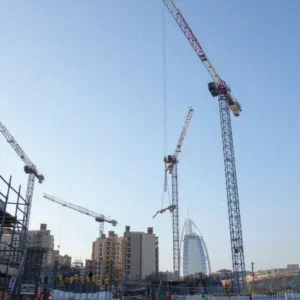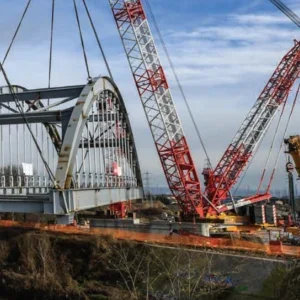“The crisis went on too long,” says Paulo Carvalho, technical director of Brazilian crane company Locabens. “Crane companies left the market.”
Carvalho is referring to the political and economic crisis that hit Brazil in 2014 in the wake of a massive corruption scandal involving Petrobras, the state-owned oil company. The impeachment of President Dilma Rouseff followed. The current president, Jair Bolsonaro, has been in office since January 2019 and has promised sweeping deregulatory reforms. GPD fell by 3.9% in 2015, and by 3.6% in 2016. Specialist opinion is divided over whether and when the crisis ended. “It is not over yet,” says Carvalho.
Locabens specialises in tower cranes, specifically Potains, for which it have been official dealer and importer for 21 years, with branches in Sao Paulo, Rio de Janiero, Salvador and the south. It has, Carvalho says, the largest tower crane fleet in Latin America.
“We are at a moment when we start looking for recovery now. All the market is waiting for the government reforms,” he says. “Just now, we believe that after reforms we will see more and more investment. Until then, not much is happening.”
“A few big projects have already started but we have a demand that is waiting for the recovery. At present we spend too much time doing nothing. Construction is 30% of what it should be. Our economy is at less than 40% of what it was.”
It is affecting, he says, not just tower cranes but mobiles, hoists, the whole market in fact. “I am vice-president of Brazil’s crane rental company association. Among our members average useage is between 40% and 45%. For smaller tools it is better, over 50%; but for big and specialised cranes usage is very low, and rental prices also are low. They are at the same level they were eight years ago.”
Nevertheless, Locabens still possesses a large fleet. “We have a very impressive fleet, of 280 tower cranes, all over Brazil. Companies such as ours cannot reduce the size of our fleet, as Brazil has high import taxes, which we have paid on our cranes. That makes it very hard to re-sell them abroad without losing a great deal of money. Only on the big cranes, or on mobile cranes of which no equivalent is made in Brazil can you get an import tax reduction. There is a law that if nothing similar is made here, then the tax is lower. But Brazil does produce tower cranes, of under 200tm capacity; 95% of our fleet are imported Potains, so we pay full tax on those. The overall effect is that if you have equipment and hard times hit, you have to keep it. You have to find other ways to survive the crisis, such as the work force and cutting costs.”
Is he expecting things to improve? “I am not sure about life getting better. Demand is really depressed. Historically, road, rail and ports have been doing nothing for a long time.
“But I take some comfort in the fact that there were 1.2 million marriages in Brazil last year, and 400,000 divorces. All those people involved will need houses—of which there is a great shortage.
"Before the crisis we had a giant house market here—too large in fact. It was not appropriate for the time. So we had a big stock of housing units. That has been reducing year by year, as those newly-weds or divorcees move into them, so we will need to build houses now. And that that will need cranes.
“We are now 80% busier than last year, but last year was really terrible so we are not jumping for joy. We do have two key job sites at the moment. One is a complex of three corporate buildings in Sao Paulo: we have a 300tm and a 280tm machine there, working shifts. So that is a help.
“And Comperj is a big petrochemical project in the state of Rio de Janiero, that famously halted because of the Petrobras scandal. Now the project is restarting, with Chinese investment. We have two 500tm cranes and one of 300tm, which will be good for us this year.
“The president has said that he wants to re-start a lot of halted jobs. 14,000 job-sites are sitting idle, all over the country. If just 10% of those start up again it would be a lot.
"Other good news is that the government is planning to sell parts of Petrobras, and also other nationalised services such as mail delivery, into private hands. That will give investment, which we need.”
Optimism, however, is not unconfined. “There are some in the market who are saying ‘We don’t want too fast a recovery; we had that in 2010 and it was too much energy into the economy at once, and the economy couldn’t cope with it’. What we need is a sustained gentle recovery, not boom and bust.
“Between 2005 and 2010 we as a company doubled our size. We worked a lot, and worked hard, but our margins were not good because everyone was else investing like crazy as well. The number of cranes around doubled; the demand for cranes did not. Strange things happened around then.
“Still, let us have cautious optimism rather than pessimism. In the oil sector, everyone has been saying we have touched bottom, so now the only way to go is up. Brazil is an exporting nation, and the exchange rate is not a problem. It is good now, at around 4 reals to the dollar. That makes it easier to export, and cheap for energy companies and the like to invest here.
“For them, the ten million dollar question is: when the economy starts to run better, will the exchange rate will rise up a bit also. If it goes to 3.5, investors will have made a lot of money. So we are hoping that investors think that way, they might begin investing now, which would be good for all of us.”






